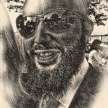Sonnet - To Science and Alone
Poems from Poe's Youth

I present to you two examples of Poe's desire for a different life, something many of us still pine for. In Sonnet - To Science, Poe expresses his dreams of a simpler time when Nymphs still roamed the land, mysteries still to be solved, and places to be discovered. In Alone, Poe gives us a rare glimpse into his childhood and his early separation between him and his fellow man.
Sonnet - To Science
Science! true daughter of Old Time thou art!
Who alterest all things with thy peering eyes.
Vulture, whose wings are dull realities?
How should he love thee? or how deem thee wise?
Who wouldst not leave him in his wandering
To seek for treasure in the jewelled skies,
Hast thou not dragged Diana from her car?
And driven the Hamadryad from the wood
To seek a shelter in some happier star?
Hast thou not torn the Naiad from her flood,
The Elfin from the green grass, and from me:
The summer dream beneath the tamarind tree?
-Edgar Allan Poe
While not one of Poe's most famous works Sonnet - To Science is one of his most provocative. He is speaking not to everyone, but only to those who understand, as he often did. This short poem is a call to those who still seek mystery and fantasy in the world and a call against those who take it away.
Poe understood science was here before him and will persist long after, but this did not stop him from lamenting it all the same. He calls science "true daughter of Old Time" implying she dates all the way back to antiquity. For science is progress. It fills in the blanks between humanity and mystery. Since then, she has seen through our fantasies leaving behind only the cold hard facts she finds.
This of course spurns the imagination. How can the dreamer and especially the writer love a science that is ever shrinking our possibilities? He even asks "how deem thee wise?". Is it really a good thing to take away our mystery? The last thing we want when our head is in the clouds is to come crashing back down. Wouldn't you say the same?
Poe even goes on to cite examples of the way science has erased her sisters of the Old Time. Diana was an ancient goddess of the moon who rode Earth's only satellite across the night sky. Until, of course, science pointed out otherwise.
Poe then refers to the Hamadryad, the Naiad, and the Elfin. Each of these nymphs represent a different part of nature. These spirits which we'd previously known to inhabit our world were replaced by the rigid facts of science. They were forced to flee to "some happier star". I unfortunately missed the memo and wound up stuck here like you.
Of course, Poe knew knowledge is important and science is for our progress, but where progress needs to move forward something needs to move out of the way. It wasn't only mythical creatures dulled to reality, but Edgar himself was moved too. For when science has solved all of our mysteries what is left to "dream beneath the tamarind tree?".
I love this poem for despite it, Poe continued on. In his youth he may have feared science was taking away life's mysteries, but throughout his life he came up with some of his own. Even becoming one of the pioneers of science-fiction writing.
Alone
From childhood's hour I have not been
As others were - I have not seen
As other saw - I could not bring
My passions from a common spring,
From the same source I have not taken
My sorrow; I could not awaken
My heart to joy at the same tone;
And all I lov'd, I lov'd alone
Then - in my childhood - in the dawn
Of a most stormy life - drawn
From ev'ry depth of good and ill
The mystery which binds me still:
From the torrent, or the fountain,
From the red cliff of the mountain,
From the sun that 'round me roll'd
In its autumn tint of gold-
From the lightning in the sky
As it pass'd me flying by-
From the thunder and the storm,
And the cloud that took the form
(When the rest of Heaven was blue)
Of a demon in my view.
-Edgar Allan Poe
Alone is the telling of an outcast's life. Without delving into Poe's personal history you may not know much of his gloomy life, but you don't need to in order to follow him on his journey through this poem.
The opening line refers directly to "childhood's hour", stating that is has always been this way. To have "not been as others were" points to Poe being different at his core. To have "not seen as other saw" points directly to having an alternate view of the world. Something that is consistent with many who lean towards creative expression.
From there, Poe claims to not feel sadness and joy as others do. When he said "I could not awaken my heart to joy at the same tone" he refers to his disconnect from the simple joys of others around him. The same way I feel when friends or family are all hyped up for sports.
"And all I lov'd, I lov'd alone." The thought of having no one to share your favorite thing with is dreadful. Nowadays, we have all sorts of outlets to find our people. Whether it is finding others who play your favorite TTRPG or have the same breed of dog, there is always someone else looking for you too. Edgar's life lacked this and you can tell.
"Then - in my childhood - in the dawn of a most stormy life" is a great line, in general, but also a monumental understatement.
Poe refers to good and evil both contributing to "the mystery that binds me still". Here he is telling us of the conflict he had between the two. This comes from a disagreement between societal norms and his interpretations thereof.
Over the next few lines Poe takes our minds on a visual journey through the world and into the sky, where he witnessed "the cloud that took the form (When the rest of Heaven was blue)". This tells us that though he passed through a storm in the sky it is only the one cloud taking form "Of a demon in my view". Just as Edgar is unique amongst the people he knows, this cloud is turbulent in an otherwise calm sky. Thereby, Poe is referring to himself as the demon amongst society.
I love this poem because I relate so well, but also because it gives us a glimpse into Poe's mind in a different way than we see from his fiction. He is actually being candid with the reader, allowing us to see what he sees in the mirror. I must also recommend you look more into Edgar Allan Poe's life and history to gain even more insight on what made him tick.
Thanks for reading. Let me know what you think of my interpretations and how you interpret these two masterfully crafted poems from the mad mind of Edgar Allan Poe.
You can find me on Facebook @TalesFromAMadman.
Don't forget to tap the heart on your way out.
Good Fortune to You.
About the Creator
Tales from a Madman
.. the figure in question had out-Heroded Herod, and gone beyond the bounds of even the Prince's indefinite decorum.
The Masque of the Red Death
Edgar Allan Poe






Comments
There are no comments for this story
Be the first to respond and start the conversation.